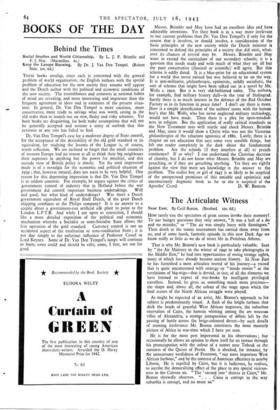BOOKS OF THE DAY
Behind the Times
Keep the Lamps Burning. By Dr. J. Van Den Tempel. (Robert Hale. los. 6d.) THESE books overlap, since each is concerned with the general problem of world organisation, the English authors with the special
problem of education for the new society they assume will appear and the Dutch author with the political and economic conditions of the new society. The resemblances and contrasts in national habits of mind are revealing, and more interesting and important than the frequent agreement in ideas and in estimates of the present situa- tion. In general, Dr. Van Den Tempel is more cautious, more conservative, more ready to salvage what was worth saving in the old order than to launch out on new, flashy and risky schemes. Yet both books are disquieting, for both make assumptions that will not be generally accepted and assume a unity of outlook that this reviewer at any rate has failed to find.
Dr. Van Den Tempel's case for a moderate degree of State control, for the acceptance of the desirability of the old gold standard or its equivalent, for studying the lessons of the League is, of course, worth reflection. We are inclined to forget that the small countries of western Europe had no reason at all to think their big neighbours their superiors in anything but the power for mischief, and this outside view of British policy is timely. Yet the total impression made is of a nostalgia for the economic and political situation of 1939 ; that, however natural, does not seem to be very helpful. One • reason for this depressing impression is that Dr. Van Den Tempel is so seldom concrete. For example, he argues against the critics of government control of industry that in Holland before the war government did control important business undertakings. Well and good, but what kind of undertakings? Was there a Dutch government equivalent of Royal Shell Dutch, of the great Dutch shipping combines or the Philips company? It is no answer to a sceptic about a government-run artificial silk plant to point to the London L.P.T.B. And while I am open to conviction, I should like a more detailed exposition of the political and economic mechanism whereby a Socialist or semi-Socialist State allows the free operation of the gold standard. Currency control is not an accidental aspect of the totalitarian or semi-totalitarian State ; it is not due simply to the nefarious influence of Professor Cassel or Lord Keynes. Some of Dr. Van Den Tempel's lamps will continue to burn; some could and should be relit; some, I fear, are out for good.
Messrs. Brimble and May have had an excellent idea and have admirable intentions. Yet their book is in a way more irrelevant to our current problems than Dr. Van Den Tempel's if only for the reason that it involves, or should involve, a consideration of the basic principles of the new society while the Dutch minister is concerned to defend the principles of a society that did exist, what- ever its chances of revival may be. Messrs. Brimble and May want to extend the curriculum of our secondary schools; it is a question that needs study and with much of what they say all but the pure conservative (classical or scientific) will agree. But this scheme is oddly dated. It is a blue-print for an educational system for a world that never existed but was believed to be on the way. It is anti-militarist, philanthropic, optimistic, mildly socialistic, the sort of scheme that might have been talked out in a novel by Mr. Wells c. 191o. But it is very old-fashioned today. The authors, for example, find military history dull—in the year of Stalingrad. Surely there is as much interest in the defence of the Red October Factory as in its function in peace time? I don't say there is more. Here is a simple identification of the authors' tastes with the human boy's that Mr. Wells, who has never neglected military technology, would not have made. Then there is a plea for open-minded- ness in religion. But the application of really critical standards to the New Testament may well startle and shock Messrs. Brimble and May, since it would show a Christ who was not the Victorian philanthropist of the reluctant agnostics of i880. Lastly, there is a chapter on sex education that says some very sensible things, but left one reader completely in the dark about the fundamental
problem. Are the schools (if they interfere at all) to preach continence? If so why? I can understand the Christian doctrine of chastity, but I do not know what Messrs. Brimble and May are preaching, or if they are preaching anything. Yet they are rightly against the view that mere sex knowledge is the answer to the problem. The realist boy or girl of 1943 is as likely to be sceptical of the unexpressed premisses of this amiable and optimistic and unconsciously dogmatic book as he or she is sceptical of the


























 Previous page
Previous page